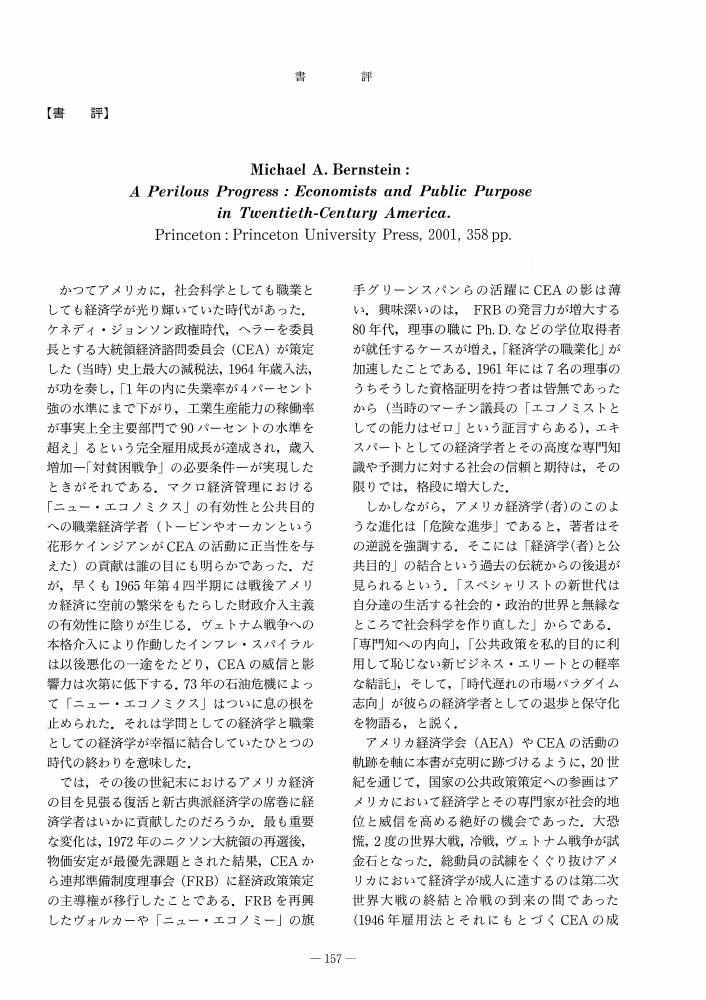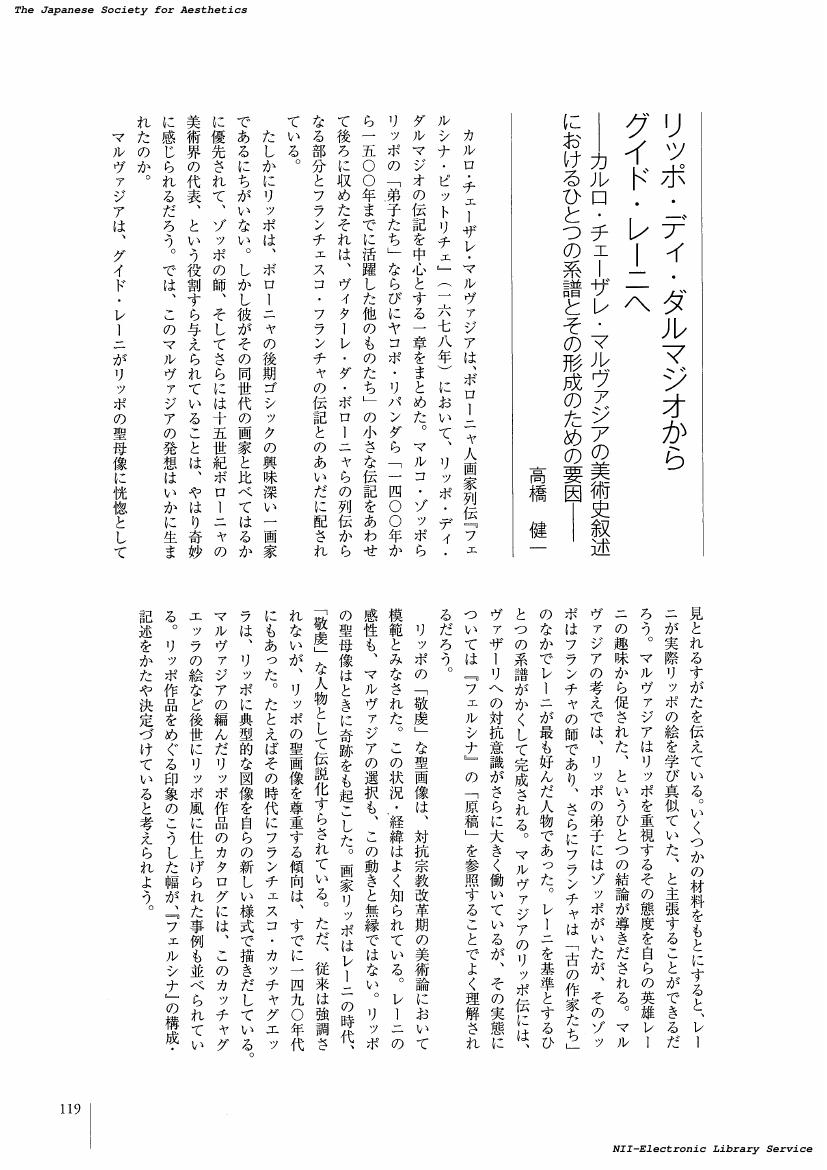- 著者
- 高橋 和男
- 出版者
- The Japanese Society for the History of Economic Thought
- 雑誌
- 経済学史学会年報 (ISSN:04534786)
- 巻号頁・発行日
- vol.42, no.42, pp.157-158, 2002 (Released:2010-08-05)
1 0 0 0 OA J. -B. セーの経済学認識
- 著者
- 高橋 信勝
- 出版者
- The Japanese Society for the History of Economic Thought
- 雑誌
- 経済学史学会年報 (ISSN:04534786)
- 巻号頁・発行日
- vol.40, no.40, pp.56-68, 2001 (Released:2010-08-05)
- 参考文献数
- 33
This paper explains how J. -B. Say's recognition of political economy involves not only economic phenomena in the strict sense, but also the institutional factors which constitute market society, i. e., property and rational agents. According to Say, political economy was due to discover “nature des choses” by adapting the experimental method, and this perspective differs from Ricardo's counterpart, which contains abstruse deduction. Revealing the main contents of “nature des choses” about the socioeconomic sphere enables us to reinterpret the political economy in Say's design. The factors he considered are as follows: (1) the decisive importance of property and thus ownership, because the existence of a certain society depends on them; (2) “principe de l'utilité” as a criterion utilized by rational agents; (3) several laws regarding exchange that ultimately represent the production, distribution and consumption of social wealth, (4) “théorie des débouchés” which is useful to scale to what extent the above-mentioned factors are soundly united. Therefore, Say's recognition of political economy is more wide-ranged than commonly supposed. As long as political economy is grasped in his thinking on the basis of “nature des choses” about the socioeconomic sphere, Say could not help but be induced to analyze the conditions and automotive characteristics inherent in a market society. Proposing that political economy should be called social economy, Say expressed his profound intentions.
- 著者
- 高橋 美弥子
- 出版者
- The Japanese Society for the History of Economic Thought
- 雑誌
- 経済学史学会年報 (ISSN:04534786)
- 巻号頁・発行日
- vol.37, no.37, pp.190-191, 1999 (Released:2010-08-05)
- 著者
- 塚本 拓也 高橋 義雄
- 出版者
- 日本スポーツ産業学会
- 雑誌
- スポーツ産業学研究 (ISSN:13430688)
- 巻号頁・発行日
- vol.31, no.1, pp.1_93-1_107, 2021-01-01 (Released:2021-01-24)
- 参考文献数
- 18
The purpose of this research was to clarify the factors related with student satisfaction and the requirements for career development for Japan’s first English sport management graduate program that fosters international sport managers, and the ideal graduate program necessary to develop human resources who can play an active role as leaders in the international sport world in Japan. A chi-square test was performed by cross tabulating each factor to clarify the relationship between “total satisfaction” and “satisfaction” of individual categories, “total career necessity”, and “career necessity” of individual categories according to the results of the TIAS graduate survey. The results indicate that there is a significant difference in the satisfaction level of the subjects in Olympic and Paralympic education and a common ground between the high group and the non-high group of total satisfaction of the graduates as a factor that affects satisfaction level. In addition, for services other than lecture content, there was a significant difference in terms of “Quality of lectures”, “Opportunities for good communication with lecturers” and “High academic support for lecture’s students”, which also represent high and non-high groups of overall satisfaction. Conversely, from the viewpoint of the career requirements of graduates, the content of the lectures differs from the satisfaction of graduates, and all lectures in the “Sport management field” have a significant difference between the high group and the non-high group of comprehensive career requirements. In addition, for services other than lecture content, unlike the results obtained regarding satisfaction, there was also a significant difference in the quality of opportunity provision between the high and the non-high group overall career needs groups and “Quality of external collaboration”, “Quality of industry network”, “Quality of students”, “Quality of administrative service” and “Quality of providing career opportunities”.
1 0 0 0 OA 音楽的空間における「ノリ」の研究
- 著者
- 松本 息吹 高橋 美樹
- 出版者
- 高知大学教育学部
- 雑誌
- 高知大学教育学部研究報告 (ISSN:1346938X)
- 巻号頁・発行日
- vol.70, pp.169-180, 2010-03-03
- 著者
- 高橋 和男 田中 敏弘
- 出版者
- 経済学史学会
- 雑誌
- 経済学史学会年報 (ISSN:04534786)
- 巻号頁・発行日
- vol.32, no.32, pp.172-173, 1994 (Released:2010-08-05)
1 0 0 0 OA 聖書, 映画, 舞踊
- 著者
- 高橋 誠一郎
- 出版者
- The Japanese Society for the History of Economic Thought
- 雑誌
- 経済学史学会年報 (ISSN:04534786)
- 巻号頁・発行日
- vol.1, no.1, pp.36-38, 1963 (Released:2010-08-05)
1 0 0 0 OA アルカディアの望遠鏡 ドナート・クレーティの《天体観測》をめぐる新しい提案
- 著者
- 高橋 健一
- 出版者
- 美学会
- 雑誌
- 美学 (ISSN:05200962)
- 巻号頁・発行日
- vol.68, no.2, pp.137, 2017 (Released:2019-01-02)
1 0 0 0 OA 藝術としての哲学 : 「よりよい意識」からのショーペンハウアー哲学の誕生
- 著者
- 高橋 陽一郎
- 出版者
- 美学会
- 雑誌
- 美学 (ISSN:05200962)
- 巻号頁・発行日
- vol.64, no.2, pp.1-12, 2013-12-31 (Released:2017-05-22)
Fur Schopenhauer war die Philosophie nicht sowohl eine Wissenschaft als vielmehr eine Kunst. Aber von dem hat er in seinem Hauptwerk keines Deutliches erwahnt. Im Nachlass der fruheren Periode seines Denkens hat er aber vom Konzept der "Philosophie als Kunst" deutlich geredet. Demnach ist die Philosophie ein Ergebnis vom "bessren Bewusstseyn" als einem Vermogen, das die kiinstlerische Kontemplation und die moralische Tugend verwirklicht. Durch diese Anschauung uber die Philosophie wurde die Schopenhauersche Philosophie konzipiert. Den kunstlerischen Moment des Hauptwerkes kann man in seiner organischen Struktur finden, "wo das Ganze jeden Theil erhalt und (…) umgekehrt auch jeder Theil das Ganze und alle andern". Diese Struktur selbst ist eine Schonheit. Aber mehr hat die Struktur bei Schopenhauer die Bedeutung als Form, die uns die "Ideen der Welt" oder "einen einzigen Gedanken" anschauen lasst. Die Welt als Wille und Vorstellung (1818/19) wurde eben gemaig der Schopenhauers Anschauung uber die Philosophie vollendet. Die wahre Vollendung der "Philosophie als Kunst" besagte, keine Spuren des Konzepts derselben zu hinterlassen.
- 著者
- 高橋 健一
- 出版者
- 美学会
- 雑誌
- 美学 (ISSN:05200962)
- 巻号頁・発行日
- vol.63, no.1, pp.61-72, 2012-06-30 (Released:2017-05-22)
Felsina Pittrice, written by C.C. Malvasia, contains a chapter that mainly discusses the life of Lippo di Dalmasio. In addition, this chapter briefly mentions the lives of Lippo's "disciples" such as Marco Zoppo and "others who flourished from 1400 to 1500". This chapter can be found between the section on the lives of "Franco Bolognese", Vitale da Bologna, and other artists and the biography of Francesco Francia. This paper considers how this idea of Malvasia was born, principally from the next points of view: (1) Guido Reni's taste, (2) the anti-Vasari context, and (3) the history of the reception of Lippo. Malvasia states that not only Lippo but also Francia was among the "ancient authors" loved by Reni. Recognizing Zoppo, Francia's master, as Lippo's pupil, Malvasia must have emphasized the genealogy of the maniera devota painters, from Lippo to Francia, which he had constructed on the basis of Reni. This understanding of Lippo may seem strange. But in the Bologna Renaissance there were more than a few Lippo-like images updated to the contemporary manner. It will be concluded that this range of impressions about Lippo's works also influenced the structure and accounts presented in Felsina.
- 著者
- 高橋 健一
- 出版者
- 美学会
- 雑誌
- 美学 (ISSN:05200962)
- 巻号頁・発行日
- vol.62, no.2, pp.119, 2011-12-31 (Released:2017-05-22)
- 著者
- 高橋 陽一郎
- 出版者
- 美学会
- 雑誌
- 美学 (ISSN:05200962)
- 巻号頁・発行日
- vol.62, no.2, pp.120, 2011-12-31 (Released:2017-05-22)
- 著者
- 高橋 妙子
- 出版者
- 美学会
- 雑誌
- 美学 (ISSN:05200962)
- 巻号頁・発行日
- vol.59, no.2, pp.173-174, 2008-12-31 (Released:2017-05-22)
- 著者
- 高橋 奈保子
- 出版者
- 美学会
- 雑誌
- 美学 (ISSN:05200962)
- 巻号頁・発行日
- vol.57, no.3, pp.70, 2006-12-31 (Released:2017-05-22)
1 0 0 0 OA ローグライクゲームにおける長期的戦略の学習
- 著者
- 高橋 一幸
- 巻号頁・発行日
- 2019-03
Supervisor: 池田 心
1 0 0 0 OA 小中学校における屈折検査
- 著者
- 野原 雅彦 高橋 まゆみ
- 出版者
- JAPANESE ASSOCIATION OF CERTIFIED ORTHOPTISTS
- 雑誌
- 日本視能訓練士協会誌 (ISSN:03875172)
- 巻号頁・発行日
- vol.29, pp.115-120, 2001-07-15 (Released:2009-10-29)
- 参考文献数
- 9
- 被引用文献数
- 1 1
小中学校での眼科学校健診において、オートレフラクトメーター使用による屈折検査を導入し、屈折分布や変化を検討した。対象は長野県小県郡丸子町の小中学生1719名で、キヤノン社製RK-3Rを用いて各眼3回以上測定し、その平均値を使用した。等価球面度数は、小学校1年生+0.09D±0.61D(平均±標準偏差)、2年生-0.17D±0.69D、3年生-0.33D±0.82D、4年生-0.50D±0.92D、5年生-0.62D±1.12D、6年生-0.99D±1.55D、中学校2年生男子-1.09D±1.61D、2年生女子-1.34D±1.39D、3年生男子-1.33D±1.75D、3年生女子-2.07D±2.17Dであった。乱視度数は、学年や男女差はなく0.4~0.6Dであった。学年が進むにつれて近視化していき、標準偏差も大きくなった。中学生では女子の方が近視化傾向が強かった。また教諭の測定した裸眼視力が良好でも、屈折異常が大きくある者がみられた。学校健診において屈折検査を導入することで、屈折状態を把握し適切な指導を行うことができ、有用と思われた。
- 著者
- 酒井 徹也 笹田 真滋 徐 千恵子 杉原 快 石岡 宏太 高橋 左枝子 中村 守男
- 出版者
- 特定非営利活動法人 日本呼吸器内視鏡学会
- 雑誌
- 気管支学 (ISSN:02872137)
- 巻号頁・発行日
- vol.40, no.5, pp.417-422, 2018-09-25 (Released:2018-10-13)
- 参考文献数
- 13
背景.気管支鏡検査は被験者の苦痛の強い検査であり,苦痛軽減のため鎮静薬などが考慮されるべきである.当院では気管支鏡検査時の苦痛軽減を目的とし,ミダゾラムと塩酸ペチジンの2剤併用による鎮静をルーチンに行っているが,本使用法は過鎮静のリスクがあり,我が国においては未だ議論の余地がある.今回我々は気管支鏡検査における本鎮静法の苦痛レベルおよび安全における忍容性を評価した.方法.2016年8~12月までの気管支鏡検査実施例で前方視的に患者苦痛度アンケートおよび術中バイタルサインのデータ収集を行った.気管支鏡挿入前に塩酸ペチジン17.5 mgと2~3 mgのミダゾラムを静脈内投与し,鎮静の深度に応じてミダゾラム1~2 mgの追加投与を行った.結果.本研究に61例が参加された.ミダゾラムの初回投与量,追加投与量の平均値はそれぞれ2.8±0.1 mg,1.8±0.3 mgであった.術中の記憶があると回答した割合は11.5%であり,気管支鏡の再検を容認した割合は82.0%であった.重篤な低酸素血症や低血圧により拮抗剤や昇圧剤を使用した症例はいなかった.結語.本研究では,気管支鏡検査におけるミダゾラムと塩酸ペチジン併用は検査中の患者苦痛が軽減され安全における忍容性も高かった.本鎮静レジメンの導入は,再生検も含めた気管支鏡検査の患者同意を得るのに有利である.
- 著者
- 高橋 永行
- 出版者
- 山形県立米沢女子短期大学国語国文学会
- 雑誌
- 米沢国語国文 (ISSN:02876833)
- 巻号頁・発行日
- no.46, pp.202-191, 2017
1 0 0 0 大学情報基盤におけるパスワード定期更新の運用と利用者動向
- 著者
- 長谷川孝博 松村宣顕 高橋秀年 井上春樹
- 出版者
- 国立大学法人 情報系センター協議会
- 雑誌
- 学術情報処理研究 (ISSN:13432915)
- 巻号頁・発行日
- vol.17, no.1, pp.107-114, 2013
<p>構成員約12,000人(アカウント総数約13,000)の国立大学法人において,120日間のパスワード定期更新の管理策をシステム要求として徹底実践した場合に起こる課題と成果を8年間の運用実績とデータに基づき考察した.パスワード定期更新の管理策を順当に履行できる利用者は約7割であった.残る約3割のパスワード失効者および忘失者に対して「IDカード認証するパスワード自動再発行機」,「指静脈の生体認証を用いた無人パスワード自動再発行機」および「窓口における対面の再発行申請手続き」を併用して対応した.「IDカード認証するパスワード自動再発行機」が最も有効に機能し,その他の再発行機能が補助的に機能した.その結果,長期に亘る本管理策運用が可能であることが示された.</p>








